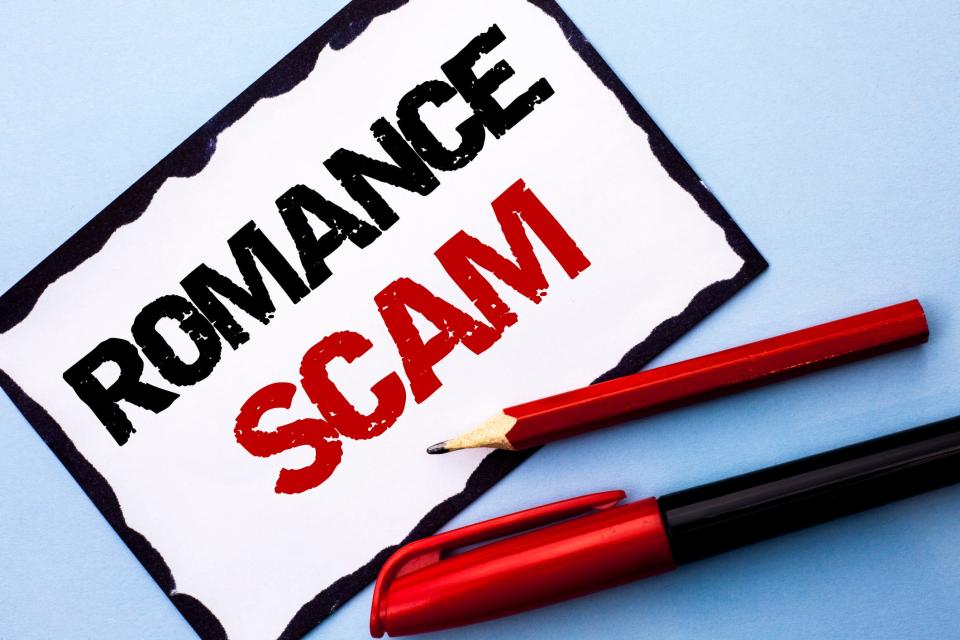Have you been catfished? How to spot red flags when online dating this Valentine's Day
While there’s lots of love in the air around Valentine’s Day, romance scammers are rearing their ugly heads, too.
To avoid tarnishing your holiday and having you throw in the towel on love for good, make sure you know the signs of romance scammers and how to avoid them.
Romance scam victims in Delaware lose millions

Whether you meet on a dating platform or fell in virtual love over social media, the internet is filled with scammers preying on hopeless romantics to make a quick buck. From deepfakes to artificial intelligence to hacking, there are plenty of ways you can be duped by online love interests.
In 2022, the most recent data available, $1.3 billion was lost to romance scams in 2022, up from $547 million in 2021, according to Social Catfish, a verification site for online profiles.
Delaware recorded the fifth-highest average loss per victim in 2022 when it comes to romance scams, with each victim losing $46,065 on average. For total money lost, Delaware ranks No. 40 with 45 victims losing $2.07 million in 2022.
In September 2023, the Delaware Department of Justice and Attorney General Kathy Jennings announced that older adults in Delaware have been a targeted demographic for various scams, including romance scams.
Wondering how scammers do it? Most create fake profiles by using stolen photos from random accounts they found online, celebrity accounts or stock images.
According to Social Catfish, the top romance scams taking advantage of online daters are profiles pretending to be celebrities, scammers persuading their online partners to invest in fake cryptocurrency schemes and profiles claiming to be members of the military stationed overseas and begging for money to fly home.
How to avoid romance scams

Now that you know the game they’re playing, don’t let romance scammers induct you into the anti-love club.
Five major red flags regardless of the type of romance scam are:
Finding other accounts with the scammer’s photos through reverse image search. If their profile is real, the photo should not be widely available elsewhere on the internet or should belong to a profile with a history of real interactions with followers.
If they ask for money or personal information, do not engage. The main goal of a romance scam is to take money from unsuspecting dating matches.
Posts or messages riddled with poor grammar, despite the user claiming to be rich and successful, don’t add up.
If someone with a sketchy profile says they can’t meet up because they are in the military or live overseas, don’t fall for it.
When scammers quickly proclaim their love and immediately want the same lovey-dovey mindset to be reciprocated, they only want to keep you engaged in their scam.
When it comes to spotting fake photos, any profile using the photos of a celebrity or claiming to be a celebrity is most likely a scam if it is not verified or doesn’t have a mass following. This goes for photos portraying a lavish lifestyle yet having little to no followers or online interactions, too.

More tips from Social Catfish to avoid romance scams include:
Research online profiles you connect with to verify their identity whether the profile and photos look realistic or not.
Only use reputable dating sites. Check the website’s safety guidelines and security features before signing up and be cautious of anyone who asks you to move your conversation to a different platform or website to continue talking, especially if it seems fishy.
Avoid continuing relationships with online connections who avoid meeting in person. If the person is real and sharing true information, they should have no problem meeting up or at least providing photos and videos you request, such as video saying a sentence you requested or a photo with your name on it.
If you get a social media message or email you out of the blue claiming they “stumbled across your platform,” find you attractive, love your personality, or another type of overly flattering claim, research them before engaging.
Valentine’s Day is the perfect time of year for romance scammers to come out of hiding, but don’t forget the ways you can stay safe from other online schemes throughout the entire year.
The state DOJ shares the following tips to help Delawareans stay safe from all scams:
Never send money, share credit card or banking information, deposit money or transfer a check to someone you do not know and trust.
Do not pay money to receive money from someone else.
If it sounds too good to be true, it probably is.
If you get an unexpected phone call from someone you don’t know claiming something is wrong with your laptop, phone or other personal account or property, hang up. Consult directly with your account providers or device companies if you are worried about an issue.
When seeking tech support, use reputable companies you know and trust.
Tax FAQ: Tax season 2024: Filing begins on Jan. 29, what to know about filing taxes for free, more
What to do if you have been scammed

If you believe you have been scammed online or extorted for money, Social Catfish recommends immediately taking the following steps:
File a report with your local law enforcement agency, the Internet Crime Complaint Center and the Federal Trade Commission.
Stop communicating with and sending money to the scammer and block them on all platforms.
Be wary of other scammers contacting you now that they know you have been scammed once before and might be more susceptible to their charms.
Protect your identity by changing all passwords and monitoring your bank account and credit cards if the scammer received money from you or collected your personal information. Enabling two-factor authentication is an extra safety measure.
Seek support from groups helping victims of scams or talk about the experience with someone close to you.
Got a tip or a story idea? Contact Krys'tal Griffin at kgriffin@delawareonline.com.
Engagement-worthy spots in Delaware: Love is in the air: Best spots to get engaged, have a Valentine's Day date in Delaware
ICYMI: 'What is this providing for my life?': A woman's sobriety journey, where to find mocktails
This article originally appeared on Delaware News Journal: How to avoid romance scams, spot red flags when online dating

